“The Wire”
Written by Robert Hewitt Wolfe
Directed by Kim Friedman
Season 2, Episode 22
Production episode 40512-442
Original air date: May 8, 1994
Stardate: unknown
Station log. So McNulty has come into the squadroom completely hung over, and—
Whoops. Wrong “The Wire”….
Bashir and Garak are walking along the Promenade. Garak is frustrated as a freighter he’s expecting that’s carrying sweaters hasn’t arrived yet, and Bashir is tired because he was up late reading The Never-Ending Sacrifice. Garak says it’s the greatest Cardassian novel ever written. Bashir found it dull in spots; while Garak sings the praises of the repetitive epic, Bashir views it as a little too repetitive. Their literary criticism is interrupted by the fact that Garak is in obvious pain. Bashir’s attempts to take him to the infirmary are met with a stern refusal, and Garak goes back to his quarters to rest rather than let Bashir examine him.
Bashir helps Dax figure out what’s wrong with one of her plants, while discussing his bizarre relationship with Garak, then heads to the Promenade where he sees Garak making a deal with Quark. When Bashir asks, Quark says it’s just for a new sizing scanner (a super-duper sizing scanner with go-faster stripes), but Bashir doesn’t believe him, especially given how agitated Garak was.
The next day, Quark summons Bashir to his bar, where Garak is excessively drunk. However, he’s not so drunk that he can’t see through Bashir’s transparent attempt to get him to the infirmary. But the pain gets bad enough that Garak collapses. Bashir has Ops beam him all the way across the hall to the infirmary rather than wait for a cart. (This is particularly hilarious given that when Quark was shot in “Necessary Evil,” Bashir did wait for the cart.)
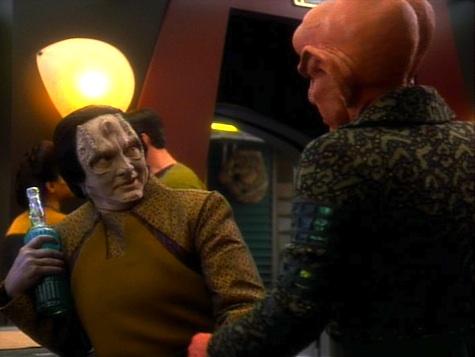
A scan of Garak reveals an implant in his brain. Odo—the closest they have to a Cardassian expert on the station—doesn’t recognize it. It’s been in place for years, but it only started causing him pain in the past few days. After Bashir mentions Garak’s deal with Quark, Odo perks up, as he’s monitored Quark making several calls to Cardassia Prime lately. He and Bashir monitor a call made late that night to a Cardassian named Boheeka who used to be assigned to the station. Quark gives him the requisition code Garak gave him, which immediately sets off an Obsidian Order alarm. Boheeka is suddenly scared to death and convinced that his career is over. Odo explains that the Order is Cardassia’s intelligence organization, the eyes and ears of the Cardassian government, and most Cardassian citizens are scared of the Order, with reason.
Garak has checked himself out of the infirmary, having left his coverall behind, which makes you wonder if he wandered home naked. Bashir goes to Garak’s quarters, where he’s giving himself a massive dose of a painkiller, which is barely doing the trick.
Finally, Garak explains what the implant is. He was given it by the head of the Order, Enabran Tain, and it was designed to go off if Garak was ever tortured. It pumps endorphins into his system, making him immune to pain and to torture, so he wouldn’t give up any intelligence he might have if captured.
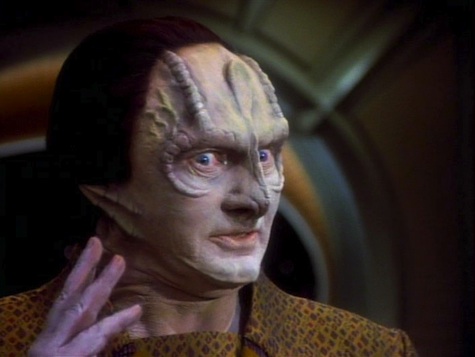
But it wasn’t meant for continuous use. Living on DS9 has been torture for Garak: the temperature is too low, the lights are too high, and the contempt of the Bajorans on the station is never-ending. So he turned the device on regularly, and eventually never turned it off, and is now dependent on it. But it’s breaking down.
When Bashir explains that Quark won’t be able to come through for him, Garak is philosophical about it. Perhaps he simply deserves what’s coming to him. To prove to Bashir that he’s not someone worthy of the doctor’s ministrations, he tells Bashir that he was a gul in the Central Command during the occupation of Bajor, and was ordered to stop some escaped Bajoran prisoners from leaving the planet. They stowed away on a Cardassian shuttle, the captain of whom refused to stop to be searched. So Garak destroyed the shuttle, killing not only the prisoners, but his aide, Elim, and several Cardassian civilians, one of whom was the daughter of an official. He was stripped of his rank and exiled to Terok Nor, later Deep Space 9.
It doesn’t even slow Bashir or his Hippocratic Oath down. He insists on helping Garak no matter what, and he convinces Garak to let him turn off the implant. Bashir remains with him while he goes through withdrawal, and refuses to let anyone see him (including a peeved Odo, who was hoping Garak could help him with some open cases he thinks the Order was involved with).
Bashir stays with Garak through the entire agonizing process of withdrawal. At one point Garak wakes up and is snappish and furious and destroys bunches of things in the cabin. He also changes his story: he and Elim were interrogating five Bajorans children. They were teenagers, street kids who knew nothing, so he let them go, and he was exiled for disobeying orders. Now he’s reduced to only looking forward to eating mediocre food once a week while staring across a table at Bashir’s smug, sanctimonious face. Garak then attacks Bashir and then has a seizure and falls unconscious.
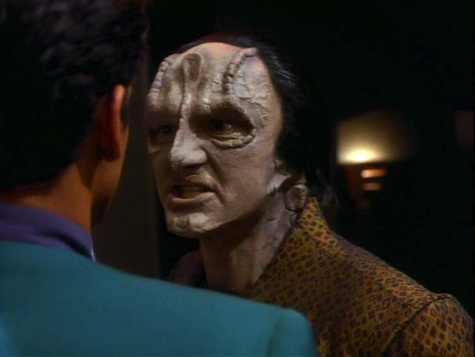
When he wakes up, he tells yet another story: he and Elim grew up together, were closer than brothers. They both became powerful men in the Obsidian Order, called “the sons of Tain.” But a scandal broke out regarding escaped Bajoran prisoners. By this time, Tain had retired to the Awarath colony and couldn’t protect them. Garak tried to frame Elim for the crime, but Elim beat him to it, and framed Garak, sending him into exile. He feels he deserved it for trying to betray his oldest friend. Then he falls back asleep.
Garak was kind enough to say where Tain retired to, so Bashir takes a runabout to Awarath to visit the retired head of the Order. Tain already knows quite a bit about Bashir, which disconcerts the doctor more than a little. Tain also asks after Garak. Bashir bluntly says that he’s dying. Tain says he should let him die, as a life in exile is no life at all for him.
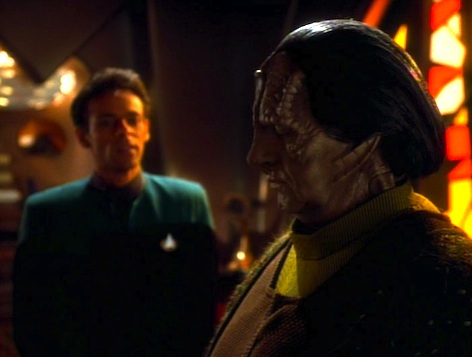
Bashir wants Tain to help him get the information to synthesize Cardassian leukocytes in order to save Garak’s life. Since Tain ordered Garak to put the implant in, he should know—but Tain never had to order Garak to do anything, that was why he was so valuable. Tain does provide the information for Bashir, because he wants Garak to live a long and miserable life on a station full of people who hate him.
Tain also reveals that “Elim” is actually Garak’s first name.
Garak fully recovers. Bashir asks which of the stories Garak told him were actually true, to which Garak says that they all were. “Even the lies?” Bashir asks.
“Especially the lies,” Garak replies with a smile.
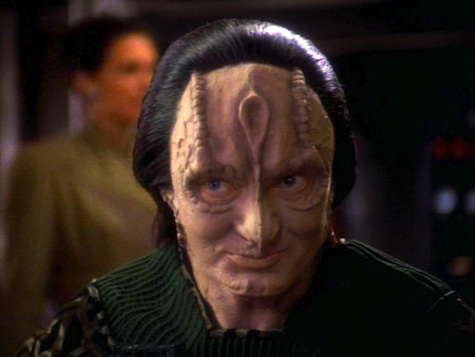
Can’t we just reverse the polarity? Bashir’s treatment of Garak is not aided by the fact that the Cardassians purged all their medical data from the infirmary computers when they pulled out of Bajor, so Bashir doesn’t have any kind of medical database to work with. Eventually, he’s able to figure out that he needs to synthesize leukocytes to make Garak better.
The Sisko is of Bajor: Bashir has to treat Sisko for a headache, induced by too much time yelling at admirals. Sisko, however, insists that he wasn’t yelling, he was disagreeing loudly.
For Cardassia! The Cardassian Obsidian Order is the most efficient intelligence organization in the quadrant. Odo says that they’re even more ruthless than the Tal Shiar. It will eventually be revealed that the Cardassian Union is jointly but independently run by the Central Command and the Order both. (Amusingly, the 1983 novel The Final Reflection by John M. Ford postulated a Klingon Empire that was very much like this. This was before The Next Generation firmly established the Klingons as Viking samurai, and Ford gave us an empire where service to the state was primary above all, and where the empire was jointly ruled by the military and by Imperial Intelligence, which was viewed with the same fear and loathing by the citizenry that the Obsidian Order is by Cardassians—and, for that matter, that the Romulan Tal Shiar was in TNG’s “Face of the Enemy.”)
Plain, simple: We still don’t know why Garak was exiled, but we do know that he was a protégé of Tain when he was the head of the Obsidian Order—though at the episode’s end, he denies to Odo that he was a member of the Order.
No sex, please, we’re Starfleet: When conversing with Quark, Boheeka asks if Hartla is still working the dabo tables, failing to waggle his eyebrows only by virtue of Cardassians not having them. He also says that she would have bankrupted him if the occupation had gone on much longer. Wah-HEY!
Preservation of mass and energy is for wimps: Odo spies on Quark’s outgoing transmissions, because his security training apparently came from the NSA. When Bashir asks if Odo has a similar bug in Bashir’s quarters, he just stares at the doctor and asks, “Should I?”
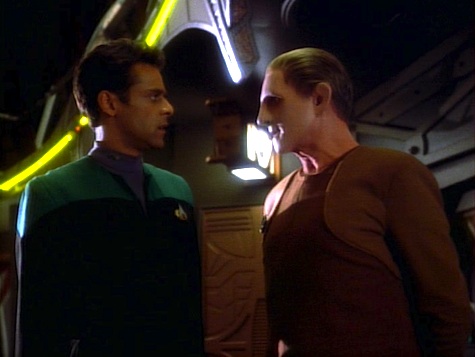
Keep your ears open: “Doctor, did anyone ever tell you that you’re an infuriating pest?”
“Chief O’Brien, all the time, and I don’t pay any attention to him, either.”
Garak and Bashir.
Welcome aboard: Not only is Andrew J. Robinson back as Garak, but he gets to be the focus of the episode. Ann Gillespie also returns as Nurse Jabara, and Jimmie F. Skaggs shows up as Boheeka.
But the big guest is Paul Dooley, making the first of four appearances as Enabran Tain. We’ll see him next in “Improbable Cause.”
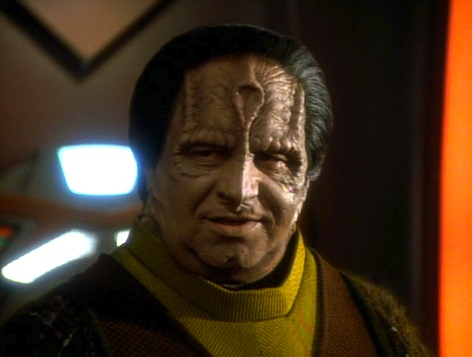
Trivial matters: This episode, besides revealing the existence of the Obsidian Order, also names the Cardassian homeworld as Cardassia Prime for the first time, and gives Garak’s first name of Elim. At one point, Garak refers to himself and “Elim” as “the sons of Tain,” and it will be revealed in “In Purgatory’s Shadow” that Garak is, in fact, Tain’s biological son, though Tain doesn’t acknowledge him as his son until moments before his death.
This is the only time Bashir’s middle name of Subatoi is ever referenced onscreen. He also says, “I’m a doctor, not a botanist” to Dax, echoing Dr. McCoy’s signature line, “I’m a doctor, not a [whatever]” from the original series.
Early drafts of the script had the intelligence organization called the Gray Order but the producers learned that Babylon 5 was going to have a Gray Council, so they changed the name.
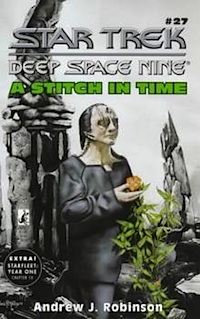
Andrew J. Robinson would, in 2000, write a novel called A Stitch in Time, which is in essence Garak’s autobiography. It’s constructed as a long letter to Bashir. Tain’s retirement and the installation of the implant are both seen in this novel.
Una McCormack has titled two of her Trek novels after the two Cardassian novels discussed in this episode: The Never-Ending Sacrifice and the new release The Fall: The Crimson Shadow. In the former, the fictional novel itself plays a role in the storyline; the latter’s title is a play on Meditations on a Crimson Shadow, the novel Garak gives Bashir at the end of the episode.
Tain is established as having retired from being head of the Obsidian Order in this episode. The novels Stargazer: Obivion by Michael Jan Friedman, the aforementioned A Stitch in Time, and The Art of the Impossible by your humble rewatcher all showcase Tain during his time as head of the Order. He also appears in Susan Wright’s The Badlands duology. His Mirror Universe counterpart is also head of the Obsidian Order, and appears in both Dark Passions by Wright and Rise Like Lions by David Mack.
Walk with the Prophets: “I see that Garak hasn’t changed a bit.” It’s always fun watching a breakout character in action, a character who’s only intended as a one-off guest star or a minor supporting character who winds up becoming more dominant due to a perfect storm of writing and acting that leads folks to want more. We’ve seen it over and over again in genre shows with characters like Spike in Buffy the Vampire Slayer, Scorpius in Farscape, Castiel in Supernatural, and so on. Hell, probably the best example is one people probably forget about now, but DeForest Kelley’s Dr. McCoy was just part of the background ensemble in the original series’ first season, not elevated to opening-credits regular until the second year from the sheer power of his awesomeness.
While lots of people qualify as breakout characters on DS9, Garak is arguably the most fascinating, and this episode cements him as an integral part of the show, as he more or less gets his own episode. We learn more about him, and more about Cardassia in the process. So much is established here, but the most important is something that we don’t really see play out so much here as in future stories with Garak (not only onscreen, but in his role in the post-Dominion War fiction, where he plays an important role in Cardassian politics, from A Stitch in Time all the way to The Crimson Shadow): he is a patriot. He and Bashir discuss The Never-Ending Sacrifice as a novel about seven generations of a Cardassian family, who all give their lives over to service to the state. Garak views it as the pinnacle of Cardassian literature, and it’s partly because he believes in Cardassia. We saw hints of this in “Cardassians,” and in Tain’s description of Garak to Bashir as someone very eager to do his duty, and we’ll see a lot more of it in the future.
Andrew J. Robinson is never bad—even when he’s ill-used as he was in “Profit and Loss,” he’s delightful as all heck—and here we get to see him in multiple modes. Not just the affable fellow who obfuscates while being charming as all heck, but also someone in pain, someone going through withdrawal, and someone barely conscious. And throughout all of it, he’s still Garak, still living up to Tain’s oh-so-spot-on credo, “Never tell the truth when a lie will do.”
But I said this was “more or less” a Garak episode because it’s also a great showcase for Dr. Julian Bashir. The rough edges of the eager young twerp from season one have been smoothed and tempered. We see here a talented doctor who is utterly dedicated to his patients—Garak’s tale of mass murder doesn’t slow him down, and Odo’s attempts to browbeat him not only fail miserably, but earn Bashir a respectful head-nod from the constable—and still willing to stay up all night reading a book he doesn’t even like because he wants to learn. He gets a scene with Dax where he doesn’t hit on her (miracle of miracles) and he also admits to Garak that he’s well aware of the fact that O’Brien thinks he’s a ponce. Bashir’s maturation has been a delightful running concern this season, and it really comes into its own here.
Warp factor rating: 8
Keith R.A. DeCandido had a grand old time writing Enabran Tain at several different points in his career as head of the Obsidian Order in The Art of the Impossible. His next foray into Trek fiction will be The Klingon Art of War, out next spring (first look here at StarTrek.com). His latest work is Ragnarok and Roll: Tales of Cassie Zukav, Weirdness Magnet, a collection of urban fantasy short stories (read an excerpt from one story right here on Tor.com).










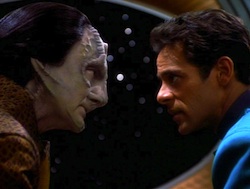
garak is pure awesome, i wish stitch in time wasnt so god awefully expensive, 40-60 used on amazon for a paper back!, someone convince the publisher to reprint it!
Among breakout characters, you’re forgetting the most important (well, to me): Donna Moss in West Wing.
I find his quote about “Especially the lies” interesting. It makes me think of BBC’s Sherlock, when Irene Adler talks about a disguise being a self-portrait (especially significant, considering how much Garak talks about masks in “Stitch in Time”. ) The lies Garak tells do reveal things: certainly, they are manipulative, in that Garak is trying to get a rise out of Bashir, make him turn away, or ultimately, make him give up. And one wonders if by making ‘Elim’ into a second person in his tales, he is literally dividing himself, showing the ‘patchwork man’ he alluded to in his book (really, no one else could have written that book but him).
If there’s one thing I love about Garak, it’s that he’s never fully a hero. Just a complex, flawed character.
Got it for $2 at Edward McCay in Fayetteville , NC.
im gonna have to check a real bookstore… who would have thought a bookstore would be better than amazon.. lol
Stitch in Time is available as an e-book for $8 or $9 at Amazon, B&N, and Kobo.
It’s weird — I think I remember being impressed with this episode, due to its strong one-on-one interplay between Bashir and Garak, but I find I have little memory of it. Or at least, no specific thing about it really stands out in my mind as being worthy of mention.
I liked this episode a lot. But I can’t help but feel that it’s just a little bit too clever for its own good. The “even the lies? – especially the lies” line in particular grates for me. It sounds like the sort of thing that a writer would find delicious to put into the mouth of a character but not at all how people would actually speak. It feels set up like a punch line.
Still, minor complaint about an engrossing episode.
Terrific performances by Siddig, Robinson and Dooley. Like Christopher, I didn’t remember much about this episode beyond its general premise, and was surprised at how good it actually was – though it’s usually a safe bet that any episode with Garak will be a standout!
Regarding the Cardassian that Quark talks to, who gets very worried when his console starts flashing ominous red – I would expect the Obsidian Order to not so blatantly alert him that he’s looking into classified information – “Even the cursed number is classified!” – so that they can more easily bring him in for questioning. Being forewarned, he might attempt to run away, or even kill himself rather than let himself be taken by them.
“This was before The Next Generation firmly established the Klingons as Viking samurai”
lolz.
One of the best DS9 episodes, where I really came to love Garak.
So it WAS mentioned before “In Purgatory’s Shadow” that Tain was Garak’s father. I wondered why something I’d already known was being presented as a surprise reveal in that episode. Apparently I took “the sons of Tain” as literal when it wasn’t meant to be. (except it really was)
Based on the title, I kept thinking the big reveal was going to be that the device was something that allowed Garak to spy on everybody and transmitted that information back to his superiors somewhere!
Great episode and I would have given it a 10. Boheeka… awesome name.
@1, syrric, abebooks has two copies in the $17-25 range.
A very, very good episode; I might even have gone as high as 9. Like some of the other commenters, I don’t remember a lot about this one, but Garak’s withdrawl symptoms, as he lashes out and breaks down in turns, are very clear in my memory. Andrew Robinson may be somewhat underrated as an actor. This is also a good showcase for Bashir as he would eventually be for most of the run, rather than the naive, overeager puppy he started out as.
We also see Garak’s real utility for the show. He is an excellent source of exposition for Cardassian politics and culture as Cardassians see them. His wry comments work so much better than Sisko getting a dry briefing from Dax or an admiral, or Kira expressing her well-earned hatred of them. It also allows us to see both sides of the coin. And as Cardassia grows ever more important to the overarching plot, that gives us much more depth than you might expect from a television show.
@7 CharlesO
“Especially the lies” might sound overly literary and not like normal conversation, but it a very Garak thing to say. Garak doesn’t talk like a normal person. He is always on, always in this persona he has created for himself (IIRC, there’s a moment late in the series when all pretense is over and he note with some regret that he was actually a rather good tailor). On top of that, he takes great delight in twitting the doctor and this is just another example of that.
And I have to say, Robinson’s Stitch in Time is a masterful work. It’s not even just a good Trek novel, it’s a great novel; showcasing an alien culture and how it’s intelligence system works and the boy trying to make his father proud. What makes it all the better is that it was written by Robinson himself, not with a ghost writer. Amazing. I got it for my Kindle a few bucks but I would like to get an actual copy of it. Did it ever come out in hardcover? But this episode was great. I loved all the reveals and how Garak kept changing his stories around and using Elim as a character in them instead of as himself. Really makes you wonder which were true, if any, and what part he actually played in the Occupation of Bajor.
No, A Stitch in Time was only ever released in mass market paperback. And it didn’t sell well initially, though good word of mouth kept sales steady for years and it remained in print longer than most other 2000 releases.
Andrew Robinson is always wonderful. I should actually rewatch this episode.
Babylon 5 had a Gray Council because Tolkien had a Grey Council, and Babylon 5 is basically Tolkien in space.
Is it my imagination or is there a Babylon5 Norn shown walking onto the Promenade just before the last conversation between Bashir and Garak?
I also have a big ol’ spot in my heart for breakout characters and Garak is definitely one of my favorites. Will have to look for Stich in Time (but not on Amazon!)
athersgeo: It’s your imagination. It’s a Kressari, as seen in, among other places, “The Circle.”
—Keith R.A. DeCandido
Let me just say that “Star Trek: The Wire” would be awesome.
It would take place on that planet that Tasha Yar was from; with the rape squads and murders and all of that. Star Trek: The Wire only on HBO. that would be good. And that’s dissapointing that it was never released in hardcover. It’s a fantastic book. To quote Andrew Robinson from the other work he’s most known for: “Jesus wept.”
This is one of my favorite Garak episodes because it’s about his personal problems not just Cardassia’s . It also adds another layer to the friendship between Garak and Bashir despite the fact that Garak lies constantly. A Stitch in Time is one of my favorite tie-in fiction novels and I guess I should have picked up a copy when I had the chance.
Boheeka’s way of speaking reminded me of Adam West.
I found the concept of a book dealing with seven generations of the same family very interesting. Of course, I think I would make it so that the tales are different and not exactly the same and repetitive as in the Cardassian version, but I think one of the major themes could be that even though these different generations all have different “adventures” and stories, it’s all basically the same. But it would be a positive sentiment, in that each new generation gets to experience the things their parents went through. I think it would be a nice little trip through history too, as the surroundings (technology and culture) change with each generation. And I think it would be interesting to see how the family moves from place to place.
@23 crzydroid
That’s your basic James Michner novel, there.
So, this is not exactly the same thing, but somebody gave me a Piers Anthony series once that was kind of like that (I think it’s called Geodyssey) – it was meant to track humanity throughout prehistory and the birth of civilization throughout variuos families. It was actually quite interesting (although I honestly don’t know how much of it holds up to current anthropology/archeaology/evolutionary biology – I think at the time it was making use of some of the more modern theories, but those could have been discredited by now) until his juvenile, sex obsessed mindset started coming through in about the third book. (Sorry if I’ve offended any Piers Anthony fans, but I’ve also read a few Xanth books and only made it through one or two before I decided his writing was pureile and misogynistic and gross – I kind of hesitate to even mention this other series but the first few books were interesting, at least, and it was a cool concept)
Andrew R. owns this! The scene where he breaks down is fabulous.
Garak is far and wide one of my favorite characters of all time.
“Especially the lies.”
Brilliant.
Being that Garak is one of my favorite characters, this is one of my favorite episodes. And when my son saw it (we’re watching DS9 together, we just finished S3 the other day), he was scared something would actually happen to Garak. He threathened to stop going to school in mourning for the rest of the year if Garak died. Robinson’s acting was certainly superb.
@8 – CNash: But Cardassian military and police, and especially the Order, delight in terrifying their subjects.
Odo’s secret security cams are reprehensible, in my opinion. That said, I love the fact they exist, because they reveal a moral flaw in a main character. And that is what sets this series apart from most other trek environments. Ds9 is populated with multifaceted, flawed characters, and that makes it more interesting. Garak is another one. At the conclusion of this episode, we have learned so much more about him, including the fact there is so much more to know about him that we don’t know. And if that makes sense, it’s particularly why I love that character so much. I dislike cookie-cutter characters and neat endings. That’s why the show Lost, in particular, is my favorite TV series of all time. Although DS9 generally gave us a plot resolution we could sink our teeth into every week, it’s still left us thinking about what we’d watched. This episode is a great example of that, and why I am enjoying my own personal rewatch.
I think Sisko had a sore throat KRAD, and not a headache, from yelling at those admirals. Was Garak exiled to Terok Nor when Dukat was in charge? Since Dukat hated Garak so much this seems unlikely and has always been an odd plot point for me. Perhaps A Stitch in Time clarified that because I haven’t read it. 17: maybe it was an early design for the Jem’Hadar before they’re appearance in the season finale?
This was a very good episode. Bashir and Garak work well together and both actors can show a wide range of emotions, too (especially Garak). What I really liked was when Bashir said he doesn’t consider Garak as a friend and “for all he cares, he’s a Cardassian spy”. You could see in his face he didn’t really believe those words he said.
What an amazing performance by Andrew Robinson in this episode. The story about the street urchins is, in my opinion, one of the best delivered monologues in all of Trek. This episode is also where I think the Bashir character really comes into his own. I especially loved the scene where he stands his ground in refusing Odo’s request to wake Garak up to answer questions about the Obsidian Order.
You gotta feel for that Boheeka character, though. After his panic attack about being discovered accidentally accessing classified files, he laments that he might be able to get away with his skin intact. Having witnessed the incident, what does Bashir do? He goes and blabs Boheeka’s name to Enabran Tain in a throw-away line: “That Cardassian Quark was talking to, Boheeka, I suppose he really did have a reason to fear the Obsidian Order.”
“What an amazing performance by Andrew Robinson”
That applies to all episodes he’s in.
@33. MaGnUs: You won’t get any argument from me. I just felt this episode was a standout even for Andrew Robinson’s considerable talents. Up until this episode, his character was always completely in control of himself, but here he’s let loose.
The Cardassians have always been my favorite species in “Star Trek,” and Andrew Robinson’s portrayal of Garak has been one of the main reasons. I’ve always been curious about whether it’s possible to read between the lines and figure out the real reason he was exiled. As is pretty well known by rewatchers, when he talks of “Elim” he’s psychologically separating himself. “Elim” is the cold, efficient, shrewd, patriotic Cardassian operative while “Garak,” is the affable, urbane, witty, likable mask. “Garak” was able to pass as a low-key gardener at the Cardassian embassy on Romulus while incidentally at the same time, “Elim” ensured several high-ranking Romulan officials never saw the light of day again. So what did he do? Was he seconded from the Obsidian Order as a gul in the Cardassian mechanized infantry and had a shuttle shot down? Unlikely. Did he let prisoners go free, the compassionate, witty “Garak” overcoming the duty-bound “Elim?” Any good guesses out there?
@35/SethC: I think Andrew Robinson’s novel A Stitch in Time, written as Garak’s first-person memoir, explains the reasons for his exile. It’s not canonical, but it’s the actor’s own version of the character’s backstory.
Speaking of that book, my brother found a NM copy for 30 bucks, when new copies online are going for 160 to 400. It covered a gap in his collection that been gnawing at him for a long time. Of course, he told me right away, we share these nerdy interests.
I believe Garak actually did reveal why he was exiled from Cardassia in this episode. Though he told three different stories to Dr. Bashir, one of them rings much more true than the others, even after Tain revealed that Garak completely made up his friend, Elim, who is mentioned in all three stories. From a writing standpoint, however, we can assume that everytime he mentioned Elim, he was really talking about himself, or his conscience.
So if we remove that and just focus on the events in the stories, which one sounds the most true? We find out in “Improbable Cause” that Tain was directly responsible for Garak’s exile. He accuses Garak of betraying him, to which Garak responds with a rare outburst of emotion: “I never betrayed you! At least…not in my heart.” From this, we can infer that Garak regrets his traitorous actions. Looking back at the stories he tells Bashir, the first and third stories can be easily shot down because neither of them involve him betraying Tain. The second story can’t be dismissed so quickly. He explains that he set free a group of Bajoran children that he was ordered to interrogate, and then send to execution. This obviously went against the practices of the Cardassian occupation of Bajor. I believe it was an offense severe enough to cause Garak’s banishment. There’s also the fact that when he tells the second story, Garak is in the middle of a severe narcotic withdrawal. I’m not sure if he was in a clear enough state to conjure up a completely fabricated story. He obviously remembered to name the false Elim, but I believe that was the extent of his trickery.
We also see in “The Die Is Cast” that Garak is no longer an effective interrogator because he breaks during his torturous session with Odo before Odo does. It’s not out-side the realm of possibility that he took pity on those Bajoran children. His personal feelings toward the Bajorans throughout the series are at worst, shown as neutral. Garak is obviously one of the most complex characters in the entire Star Trek franchise, and he never peels back all of his layers, but I believe the reason for his exile is a layer he did reveal.
Lockdown rewatch. In hindsight I suppose if you have an episode about anything on television called “The Wire” you better hope it’s a good one and fortunately this is. It’s about Treks best ever recurring Character in Garak which sets it up as a winner from the start and then introduces the Tain and Obsidian order backstory that serves to set up so many excellent episodes and plot lines going forward. And as was said in the main review this was Also Bashir’s best episode up to this point as well. I would always see this as a minimum 9 out of 10 maybe even a 10.
Something interesting that just occurred to me–that Garak disassociated from “Elim” in much the same manner as the prisoner in “Duet” disassociated himself from “Marritza”. It gives me a fresh insight into this story.
One thing that’s always bugged me about this episode is the scene where Dax has Bashir look at her sick plant. I find it hard to believe that Bashir can google up how to cure the plant in five seconds, and Dax hadn’t thought of that…
@41/Thierafhal: Maybe Dax just preferred to reach out to another living person than to settle for looking something up on a computer.
@42/CLB: That’s a good point. And once past the “bugging me” part, it’s actually a nice character scene. However, it still has me thinking to myself, ehhhh, ok…
@41: that scene is solely there to be one of those inch-deep/mile-wide metaphors that Trek writers of that era loved so well. The plant requires a certain thing to live that it’s no longer getting, so Dr. Bashir had to synthesize a substitute for it, just like with Garak. The problem is that the metaphor illuminates nothing interesting, it’s just a cutesy little maneuver that should have been cut.
Should anyone here be interested in a good book dealing with seven generations of the same family, I highly recommend Gabriel García Márquez’s One Hundred Years of Solitude / Cien años de soledad.